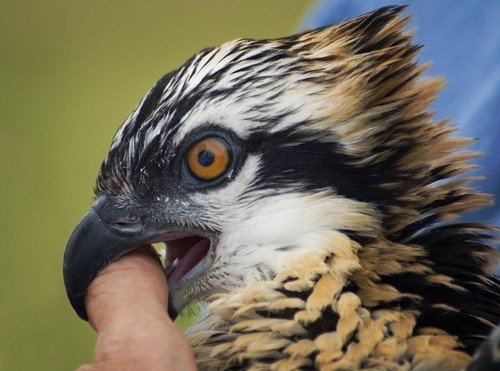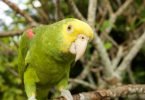Birds preening from time to time are quite normal. However, when birds start chewing their own feather, feet or nails, and your home furniture, it’s a sign of aggression. Such behavior may cause medical or health problems such as infected skin and inflammation. Is your bird chewing on everything? You may want to find out why by clicking here.
Instead of wondering how to stop a bird from chewing wood or wires, simply take it to the avian vet. Only an avian vet can rule out risks of physical problems. If there are no such physical issues, it could be a psychological behavior. Seek immediate medical attention if the bird’s skin looks infected, red, and swollen.
Step 1: Take the Bird to the Avian Vet
The first step is to get your bird to the avian vet and get it screened for any possible underlying conditions. If the bird has been chewing on feathers, it could be one of the causes of lack of feathers. However, the risks of a medical condition cannot be ignored. Diseases such as psittacoses beak and feather disease or giardia are among some of the leading problems that cause birds to lose their feather.
When you visit the vet, seek treatment for infected skin. If the bird is plucking out its feathers, it could be a deterrent for the skin. If you observe signs like reading bald spots, scabs, and inflammation, take the bird for treatment.
Some birds may be chewing the cage wires or even wooden furniture. These destructive habits should be monitored right from the start. If not, it may lead to a weak beak.
Step 2: Change Dietary Habit
Aggressive chewing may be caused due to malnutrition. When the body lacks nutrition, it may cause frayed feathers, itchy skin, and compel the bird t chew or pluck. Ensure your bird gets adequate calcium, selenium, magnesium, zinc, and manganese in the diet.
Before buying bird food, ensure the following:
- Read the label to check the essential nutrients contained
- Supplement one meal with fresh vegetables like carrot tops, kale, leafy lettuce, and bok choy. Give at least 25% of vegetables in its diet
- Give fresh fruits like mango, apple, berries, or papaya
However, do not feed sugar, dairy, salt or flour to your bird. Such foods may lead to inflammation, which would eventually cause aggressive chewing.
An elimination diet is also good for birds. Some birds are sensitive to foods such as corn, soy, peanuts, sunflower seeds, and semolina. Remove these foods from the diet for 30 days to see the difference. Reintroduce the same foods after 30 days, but one at a time. Let the bird have the reintroduced foods several times during the week and monitor the symptoms. If symptoms return, stop those foods immediately.
Step 3: Keep your Bird Busy
Birds are social creatures. It would help if you spent quality time with your bird. In fact, birds that feel isolated or bored may resort to chewing, biting, and other aggressive behavior. Make sure to let the bird out of the cage for at least one hour a day. Let it socialize with other members of the family.
To keep your bird busy, give some wooden toys. When it has enough toys to play, it will not bite or chew on anything you don’t want it to. You can give special toys that allow birds to run the beak over fibers, which stimulates the sensation it gets from chewing wires of plucking feathers. Rotate the bird’s toys every week and keep it busy.
Do not pay attention to your bird’s aggressive chewing behavior. The more attention you put, the worse it gets. It is then that the bird becomes conscious of your action and may start chewing more frequently for attention.
When your bird is chewing, do not scold or yell. The bird might take such responses for attention and indulge in frequent chewing.
Step 4: Remove the Stressors
How to get a bird to stop chewing wires?
Well, simply remove the stressor from its life. Stress is the main reason behind birds chewing feathers, tails, cage bars, wires, and furniture.
But what could be the cause of stress?
It could be the cage in which your bird stay; maybe it is too small for the bird to move around. It could be the kitten roaming in the house. It could be your behavior or voice.
Since birds cannot speak out, you have to try to understand what they want to say. Observe the bird for some time and see if you can find out something. If you can, start making small changes to make a difference.
Step 5: Treat the Bird with Love and Affection
Start treating your bird as your own kid. Treat it with a lot of love and care, just as you would treat your toddler. When your bird is out of the cage, be gentler and calm.
Do not let the bird go out of sight as it might start destruction. Also, do not allow the bird to get access to that furniture, which it already chewed. In fact, you should aim to keep your bird away from all types of wooden furniture in the house as much as possible.
Final Word
Birds are adorable creatures. However, their nature is different from other pets. Give some time to yourself and the bird to adjust to the environment. If it has been biting too often, make a quick trip to the avian vet.
Before getting a bird, try to read up about the nature of the bird, its habits, and some general information. This way, you would be mentally prepared for anything that is about to come.
As a first-time bird owner, do take professional advice from a vet instead of trying out new things yourself. While experimentation is good, it may make things worse. It’s best not to take risks.





